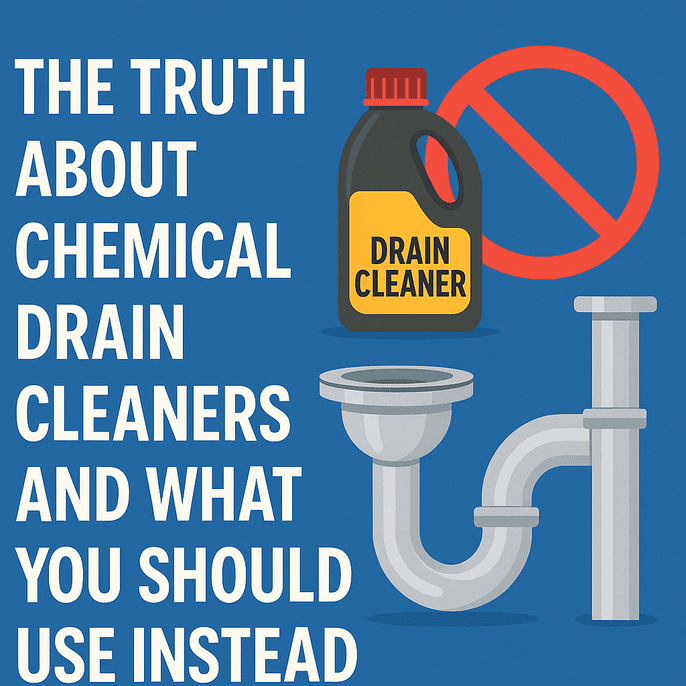When your sink or shower drain clogs, it’s tempting to grab that bottle of chemical drain cleaner promising a quick fix. However, what many homeowners don’t realize is that these products often cause more harm than good. From damaging your plumbing system to releasing toxic fumes into your home, chemical cleaners pose serious risks. Let’s uncover the truth behind them—and explore safer, more effective alternatives you can trust.
Why Chemical Drain Cleaners Are Dangerous
1. Harsh Ingredients That Eat Away at Pipes
Most chemical drain cleaners contain caustic substances such as sodium hydroxide (lye) or sulfuric acid. While they can dissolve organic materials like hair and grease, they also corrode metal pipes and weaken PVC joints. Over time, this leads to leaks, cracks, and costly plumbing replacements.
Even “safe for pipes” versions aren’t truly safe—they may just take longer to cause visible damage.
2. Harmful Fumes and Indoor Air Pollution
When these chemicals react with organic matter in your drains, they release toxic gases such as chlorine and ammonia vapors. These can irritate your eyes, nose, and lungs, especially in poorly ventilated bathrooms or kitchens. Prolonged exposure can even cause respiratory distress and worsen asthma or allergy symptoms.
For households with children or pets, this risk becomes even more alarming.
3. Environmental Contamination
When you pour chemical cleaners down your drain, the residue often ends up in wastewater systems or septic tanks. From there, it can contaminate soil and groundwater, harming aquatic life and disrupting the natural balance of ecosystems.
Simply put—every time you use a harsh cleaner, you contribute to chemical pollution that affects everyone.
4. Temporary Results That Mask Bigger Problems
Chemical drain cleaners rarely solve the root cause of the clog. They may clear the blockage temporarily, but grease buildup, soap scum, or tree roots remain deep within the pipes. The result? The clog reappears days or weeks later.
By using these quick fixes, you delay proper diagnosis and maintenance, making future repairs more expensive.
The Safer Alternatives: What You Should Use Instead
1. Enzyme-Based Drain Cleaners
Unlike harsh chemicals, enzyme drain cleaners use natural bacteria and enzymes to break down organic waste. They are biodegradable, non-toxic, and safe for all types of pipes.
These biological formulas effectively digest hair, soap, and grease without generating heat or fumes. They may take a little longer to work, but they deliver long-lasting results while protecting your plumbing and the planet.
2. DIY Natural Drain Cleaners
If you prefer a budget-friendly and eco-safe solution, try this simple baking soda and vinegar method:
- Pour ½ cup of baking soda into the drain.
- Follow with ½ cup of white vinegar.
- Wait 15–20 minutes as the fizzing reaction breaks down buildup.
- Flush with boiling water to clear the pipe.
This natural combination creates a mild cleaning reaction that helps remove grease, grime, and odors—all without toxic residues.
3. Plumbing Snake or Auger
A drain snake (also called a plumber’s auger) is a simple mechanical tool that physically removes clogs. It’s especially effective for hair blockages in bathroom drains and food waste in kitchen sinks.
For deeper or more stubborn clogs, professional plumbers use motorized augers or hydro jetting equipment, which clean your pipes thoroughly without any chemicals at all.
4. Preventive Drain Maintenance
The best drain cleaner is prevention. Follow these easy habits to keep your pipes free-flowing:
- Use drain strainers to catch hair and debris.
- Avoid pouring oil, grease, or coffee grounds down the sink.
- Flush drains weekly with hot water and a small amount of baking soda.
- Schedule professional drain inspections annually to identify hidden issues early.
Consistent maintenance prevents buildup and eliminates the need for emergency chemical treatments.
How Professional Plumbers Handle Clogs Safely
A licensed plumber never relies on chemical cleaners. Instead, they use diagnostic tools like drain cameras to locate the exact cause of blockage. Based on their findings, they apply solutions such as:
- Hydro Jetting: A high-pressure water jet that safely scours pipes clean.
- Pipe Descaling: Removal of mineral buildup using eco-safe tools.
- Root Removal: Specialized cutting heads to clear tree roots in outdoor lines.
These professional-grade methods ensure your plumbing system remains efficient, long-lasting, and environmentally responsible.
Why You Should Stop Using Chemical Cleaners Today
Let’s recap why it’s time to ditch chemical drain cleaners once and for all:
- They corrode your pipes and shorten their lifespan.
- They release toxic fumes harmful to humans and pets.
- They pollute waterways and harm the environment.
- They provide only temporary relief, not real solutions.
Switching to eco-friendly alternatives like enzyme cleaners or professional hydro jetting is an investment in safety and sustainability—for your home, your family, and the planet.
Final Thoughts
Chemical drain cleaners may seem like an easy fix, but the long-term consequences far outweigh the short-term convenience. Choosing natural or professional solutions not only protects your plumbing but also promotes a healthier home environment and a cleaner world.
If you truly want clear, reliable, and environmentally safe drains, make the switch today—because when it comes to your home’s health, there’s no shortcut worth the risk.


